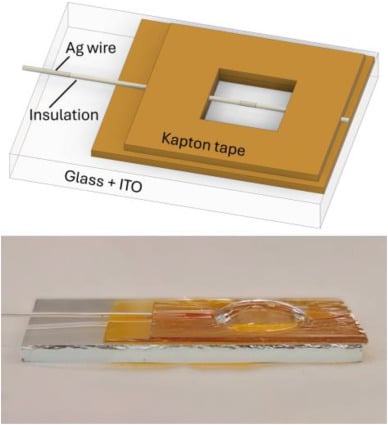An revolutionary electrode device now permits exact measurement of vitality ranges in OLED semiconductors, for improved effectivity and longevity in natural electronics.

A brand new examine finished by researchers of Institute of Computational Physics, Zurich College of Utilized Sciences, Switzerland presents a cutting-edge built-in reference-counter electrode (IRCE) that refines the electrochemical characterisation of frontier vitality ranges in small-molecule thin-film semiconductors, a significant part of natural light-emitting diodes (OLEDs). Developed by researchers aiming to deal with the complexities of correct measurement, the IRCE leverages a gel polymer electrolyte embedded with a silver quasi-reference electrode, streamlining evaluation and probably providing useful insights for OLEDs and related natural digital functions.
OLED know-how calls for exact willpower of the very best occupied molecular orbital (HOMO) and lowest unoccupied molecular orbital (LUMO) ranges for efficient machine modeling and efficiency optimisation. The examine calibrated the IRCE utilizing ferrocene, an inner commonplace, to ascertain an absolute vitality reference. Comparative stability checks confirmed the IRCE’s reliability, aligning it intently with the normal Ag/AgNO3 reference electrode whereas presenting a extra streamlined and versatile method for electrochemical measurements.
The IRCE meeting was rigorously examined utilizing cyclic voltammetry on a number of OLED semiconductor supplies, together with NPB, TCTA, PO-T2T, and an NPB:PO-T2T exciplex. The supplies exhibited distinct responses, underscoring the IRCE’s sensitivity to numerous molecular interactions. NPB, a widely-used OLED materials, confirmed constant and secure HOMO degree readings that aligned effectively with these derived from conventional strategies, like UV photoemission spectroscopy. This alignment demonstrates the IRCE’s capability to reliably replicate advanced, high-accuracy measurements.
For supplies like TCTA, the IRCE revealed indicators of electropolymerisation, indicating a possible avenue for in-situ monitoring of chemical adjustments. Such insights are important for researchers engaged on natural semiconductors, because the IRCE supplies a sensible method for observing interactions immediately throughout the thin-film context. Moreover, the HOMO degree of the NPB:PO-T2T exciplex displayed minor shifts, highlighting molecular interactions throughout the exciplex construction—findings that might inform OLED effectivity enhancements.
The IRCE’s versatility makes it significantly appropriate for researchers and engineers creating natural semiconductors for OLEDs, natural photo voltaic cells, and different digital gadgets. The machine provides a sensible methodology for figuring out HOMO and LUMO ranges immediately inside skinny movies, enhancing analysis effectivity and precision. With functions extending throughout natural electronics, this examine positions the IRCE as a useful asset for advancing each the analysis and sensible implementation of OLED know-how.
👇Comply with extra 👇
👉 bdphone.com
👉 ultraactivation.com
👉 trainingreferral.com
👉 shaplafood.com
👉 bangladeshi.assist
👉 www.forexdhaka.com
👉 uncommunication.com
👉 ultra-sim.com
👉 forexdhaka.com
👉 ultrafxfund.com
👉 ultractivation.com
👉 bdphoneonline.com



